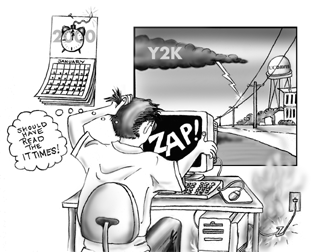 | |
 |
by Jeff van de Pol
First, let's take a look at the basic utilities. According to a recent Senate Special Committee Report on the Year 2000 Problem (http://www.senate.gov/~y2k/), nearly everyone in or near American metropolitan areas should have continuous electric, gas, water, and wastewater service. However, it is recommended that you read the Y2K readiness disclosure statements you get in the mail from the companies with which you do business. The phone companies are largely Y2K-compliant, and the main anticipated problem might be a glut of phone calls (similar to holiday usage) by people checking to see if their phone works. The financial industry is also well prepared for the upcoming potential ballyhoo, and the federal reserve has strengthened cash reserves enough to handle any rush on the banks. While the bank should still be the safest place for your money come January 1, keeping a small cash reserve on hand (enough for 3-5 days) is still recommended.

Home computers are a slightly different story. Most computer hardware purchased after 1993 should be fine, but several applications may need to be checked for date-sensitive glitches. See the UC Davis Y2K site (http://y2k.ucdavis.edu/) for information on how to perform diagnostic tests on your computer. While the United States is largely prepared for Year 2000 computer problems, serious concerns remain, particularly in health care, small business, and local government. The truth is no one knows exactly what will happen, and invariably there will be a few glitches the first several days of January. The Senate Committee recommends that you "be in a position to handle inconvenient interruptions in basic services." If concerned, check out http://www.consumer.gov/y2k/. This page links to U.S. Government telephone hotlines for consumer and small business information. When shopping for supplies, listen to the experts. What nearly everyone involved with the Y2K issue agrees upon is that people should treat this unique event like any other possible emergency (a severe winter storm seems to be the most common example). With this in mind, make sure you have flashlights, batteries, warm blankets, and enough nonperishable food for several days . For those of you who take medication, check with your physician if you are concerned about a Y2K-related disruption in supply. A last bit of advice: start now. Right now. The New Year is fast approaching, and holiday shopping and planning will suck up most of December. The Web offers useful Y2K information, but it will become increasingly difficult to access as more and more people start their own preparations. In a nutshell, don't believe the hype, but listen to and heed the warnings. Above all, be informed and be early. Happy New Year!
|